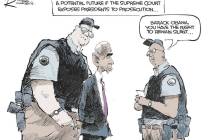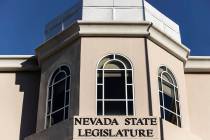Casinos shouldn’t shoulder education burden alone
Soak the rich? Sure.
The idea has fallen out of favor in recent years, at least since Ronald Reagan became president, but progressive taxation is a sound and accepted practice of long standing. The 18th century capitalist icon Adam Smith, probably unfamiliar to the late Gipper, endorsed the practice.
Those who have more should pay more. They have more disposable income, so they can afford to pay at a higher rate. Those who have less should pay less. With a lower tax burden, they have greater opportunity to escape the ravages of poverty.
This is the fundamental reasoning behind the Nevada State Education Association's ballot initiative to raise the gaming tax to fund education. The casino industry is rich. It can afford to pay more. The school system is poor. It needs money to escape the ravages of poverty.
Unfortunately, the teachers union plan is fatally flawed.
A central tenet of progressive taxation is that all the rich pay the higher rate, not just some of them.
The teachers, by contrast, would single out one industry to pay more. It's a big and successful industry, for sure, representing a large segment of the state's economy, but the plan nonetheless lets other big industries off the hook.
Consider some Nevada businesses that obviously bring in a ton of money but have not been targeted: fast-food chains, gourmet coffee shops, road builders, discount department stores, mines, lawyers, doctors and medical facilities, pharmacies, pet supply stores, payday loan centers.
Why should these industries get a free pass?
What the teachers are suggesting with this initiative is that the casinos are responsible for improving Nevada's educational system, but other industries are not. That doesn't make sense.
The teachers' initiative will be politically popular anyway. Polls show a large majority of Nevadans have no qualms about soaking the casinos. They see the casinos investing tens of billions in Las Vegas, across the country and overseas and figure they can afford it. There is the impression, as well, that the casinos owe the state more than they are delivering. There's also the selfish reasoning that if the casinos pay, the rest of us won't have to.
History is a factor. Just a few decades ago, gambling was widely considered a sin. Games of chance were a crime in 49 states. Federal agents raided illegal gambling dens in numerous cities, forcing the underground operators to take refuge in Nevada.
Nevada was a rogue state, bucking the national culture by allowing a sinful industry to thrive outside the shadows. In those days, the casinos did owe the state a little something extra.
Times changed. Today, some form of gambling is legal in 48 states. Tens of millions of people don't see any significant difference between feeding a slot machine and rolling a bowling ball.
Yet a gaming tax remains in Nevada and other states. Casinos pay all the usual taxes, and then a gaming tax is imposed on top of them.
It's not completely unreasonable. Casinos require extra layers of regulation and scrutiny, and this costs the state millions of dollars.
But it seems just a little unfair to expect the casinos to foot the bill for Nevada schools.
That said, the education bill damn well needs to be footed. Nevada's education funding per student is 49th in the country.
It's disgraceful that a state enjoying rapid growth and tremendous wealth, a state that sees itself as an emerging international player in the new millennium, has so crassly neglected its public schools.
The excuses are really getting tired.
A tax system that properly funds the schools -- as well as the highways, mental health care, etc. -- should be Nevada lawmakers' obsession.
Rather than worrying about arming professors or exploiting loopholes in campaign law, elected officials should concentrate on sound and fair methods to fix the way public services are funded.
Frustrated by legislators' cowardly refusal to address this core issue in Carson City, the teachers are trying to come up with an answer. They deserve some credit for that. While one of their primary motivations is self-serving -- making higher wages -- they remain on the right side of the issue.
Still, their proposal to soak the casinos for at least $250 million per year while letting everyone else go free is wrongheaded.
I don't have any great affection for the gaming industry. I don't work for a casino. I rarely gamble. I don't go to the clubs. I'm irked by having to walk through a smoky casino to see a movie with my kids. I don't have any conflicts of interest to disclose here.
What's more, I don't think the teachers' proposal to raise the gaming tax by 3 percentage points would do much, if any damage to large Nevada casinos. MGM Mirage chief Terry Lanni's claim that a 3-point hike would drive investment out of the state seems beneath his usual sensibility.
Nevertheless, Nevada's education funding crisis -- and yes, it's a crisis -- ought to be fixed properly, not by exploiting a knee-jerk populist sentiment. Everyone in Nevada needs to share the burden of properly educating children.
Geoff Schumacher (gschumacher@ reviewjournal.com) is Stephens Media's director of community publications. He is the author of "Sun, Sin & Suburbia: An Essential History of Modern Las Vegas" and, coming in February, "Howard Hughes: Power, Paranoia & Palace Intrigue." His column appears Sunday.
GEOFF SCHUMACHERMORE COLUMNS























